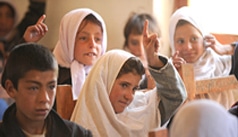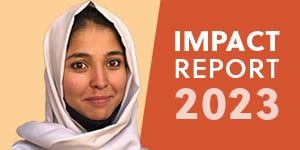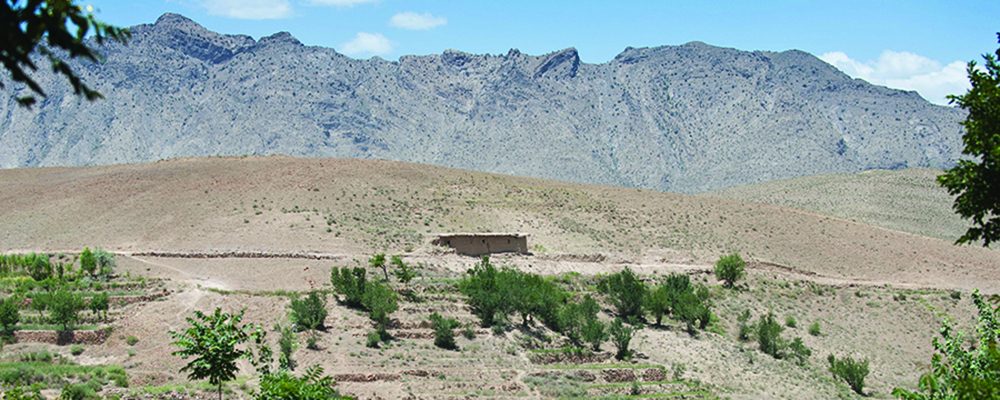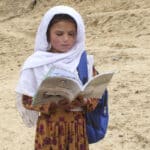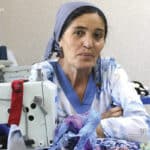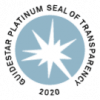CAI HERO: Drukhshan
by Karin Ronnow
Multilingual mathematician wants to be a doctor
 Some children are just born learners. They dive into their studies with excitement and determination. They glom onto every bit of knowledge that comes their way. And they dream big.
Some children are just born learners. They dive into their studies with excitement and determination. They glom onto every bit of knowledge that comes their way. And they dream big.
“Mathematics is my favorite, I think it is like a game,” said Drukhshan, a 12th grader at Ishkashim Girls’ Higher Secondary School in Afghanistan’s northeastern Badakhshan province. “When we solve a question it’s so interesting.”
The 17-year-old is one of the top students in her class. She dreams of going on to university, studying medicine, becoming a doctor, giving back to her community, and seeing the world.
“It’s important for every person to be educated,” she said. “For example, if you are not educated you must stay at home and just do chores and that is so boring. If you are educated you can travel, communicate with different people all over the world.”
Communication is important to her, and she works hard at it. Although she’s not as fond of English as she is of math, her spoken English and comprehension exceeds that of most of her classmates. She accomplished that, she said, with the help of additional courses.
“We study English in school, but there we only read and write it, we don’t speak it,” she said. “So I took classes after school. We all know that English is an international language and we should learn it. I’d like to learn all the languages of the world.”
But she knows not everyone shares her enthusiasm.
Enrollment at her school, housed in two buildings erected by Central Asia Institute in 2008 and 2009, is 1,005, said Headmaster Atah Baik. But when he reviewed the attendance sheets and accounted for the girls who have quit (but remain on the enrollment list – a common practice in Afghanistan), the number of students drops to 835.
That doesn’t surprise Drukhshan. “There are many people here who don’t let their daughters go to school, or they let them but they don’t try to understand the value of education,” she said.
“The girls say they don’t have any interest in education because their parents don’t have any interest. They are like people who live in the 18th century. So the girls just come and go and don’t study. They will just finish school and get married.
“I like to learn in a competitive environment, but when I see my classmates not caring and so bored, then that drives me crazy,” she said. “I feel very frustrated. Sometimes I talk to them and say, ‘Even if you are not responsible for yourself or your future, what will you say to your children? You are going to be a mother. At least you can improve the lives of your children so that they can be future leaders of Afghanistan.’”
Drukhshan learned that lesson at home. She comes from a relatively small family of three children. Her father works for the Aga Khan Foundation. Her mother is a housewife.
Drukhshan was born in 1997, when the Taliban controlled the government in Afghanistan. “My mother said it was a terrible time,” she said. “We went to Pakistan when I was 1½ years old, to Karachi. I completed nursery school there. When I came back, I was about 6 years old.”
Her mother, who has a basic education, said she has always emphasized education for her children. “But I especially wanted my daughters to be educated—even more than other kids.”
Drukhshan’s sister, Aalam Gul, studies politics and sociology at university in Bishkek, Kyrgyzstan, with help from a George Soros Foundation scholarship. She, too, is bright and well spoken. When asked what she’d like to do with her degree once she finishes university, she said: “Fight for women. This is the only thing to say. Because nothing has been done for women, especially in this environment.”
Why? “Because they don’t fight, they don’t have opportunities. I don’t mean literally ‘fight.’
I mean they need more attention. When you see women in Afghanistan you feel very sad for them and for yourself. The situation here is miserable and we do not have a voice, we are not listened to.”
Drukhshan said that in addition to a love of learning, her parents instilled a desire to serve in all their children.
“My mother really wants me to serve the people,” she said. “One should do this because everyone has a need.
[CAI] serves us by making the school. I should serve by helping the people improve themselves.”
To that end, she hopes to become a doctor. “I want to go to medical university. If I don’t get accepted, then I’m going to study economics,” she said. “But I really want to be a doctor, because being a doctor is very helpful to people who can’t treat their sickness. I want to work in Ishkashim or even in Pamir. I want to have a foundation so I can treat people without any fees. I am going to be there in future. I am.”
She faces hurdles. “There is no scholarship for medical studies in Afghanistan,” she said. And even now she’s not a big fan of homework, which she will be doing for another decade if she gets into medical school.
“I hate homework. It’s the hardest thing,” she said, laughing. “Writing in notebooks is really boring—except for math.”
But she’s determined. She will finish school in December and take university entrance exams in January, she said. If she can get a scholarship and study abroad, she’d love to go that route. “If not, I will continue my education inside the country.”
She said education is key to her future and that of her community. “We are in a very poor community. My community people need help, and for myself, I also need help. I don’t want to be like this anymore. If I have education then I will have my own money and will not be costing everyone else. I want to get educated and be responsible for it.
“Also we know that differences between educated and uneducated persons are many.
Education is the best way to meet new people, travel to other countries and learn about the world and the beauty of life,” she said. She’s on her way.
